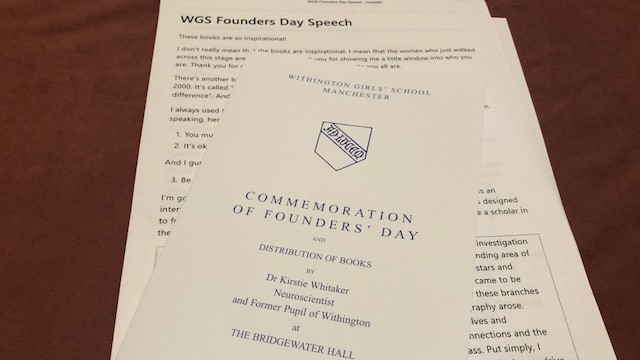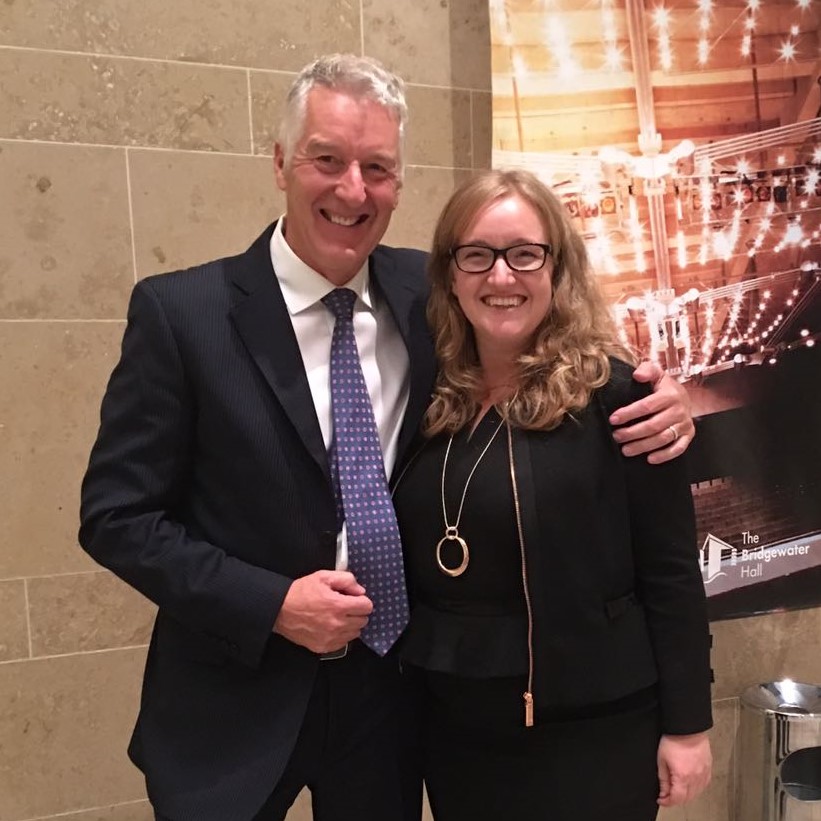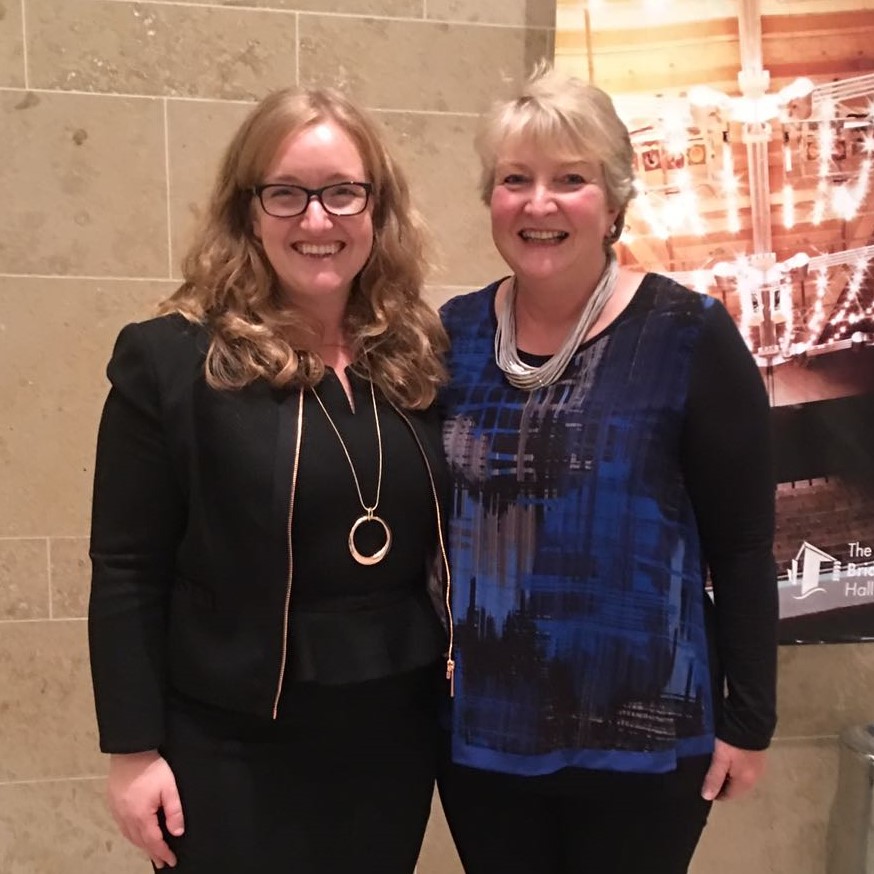WGS Founders Day speech
Yesterday I was back in Manchester for my school’s Founders Day. It’s a day where the whole senior school (11-18) and the oldest members of the junior school come together to celebrate everything that the girls in the school have achieved over the last year.

Writing the speech
I attended Withington Girls' School from 1992 to 2001. It’s a highly selective private school - I had to take an entrance exam aged 9 and another aged 11. And my family paid a lot of money for me to go there for those nine years.
The first version of my talk was approximately 4 hours long. I had so many things to say to the students.
I wanted to talk about the fact that by going to an all girls school I was protected from (perceived) misogyny until I was 29 years old. (When it did happen it was so stereotypical it was laughable - I said something in a meeting and a man re-stated it 5 minutes later to great appreciation from the rest of the group. It was the first, but not the last, time this happened.)
I wanted to tell them about the incredibly valuable conversations I’ve had with my friends about my wealth privilege. I never thought of my family as rich when I was growing up, but we certainly never worried about where rent or our meals were going to come from, and I’ve always been protected from the stresses that those worries bring.
I wanted to describe all the “extra-curricular” activities I’ve done in my life. To show them that a female physicist can teach dance for kids at Stagecoach theatre school, play in the orchestra, sing in the choir, perform Shakespeare, play for sports teams, run a hall of residence bar, coordinate a student ski and board club, raise money for HIV/AIDS by riding 545 miles every year, teach dogs how to search for hidden scents, demonstrate how an MRI machine works to teenagers, their teachers and policy makers, and so much more.
I wanted to tell them how my friends came to take care of me and my 8 week old puppy when my boyfriend died on Mount Shasta in 2010. How they’ve always taken care of me, and still do take care of me in my hardest times. How international friendships will be as strong as family ties because you have to find your support network when you’re so far from home.
But, I only had 7 minutes. So what follows are the most important points that I could find to speak to me of 18 years ago.
(For it to make sense, you need to know that I’ve just presented each of the upper sixth - the oldest girls in the school - with a commemorative book that they’d chosen.)
Founders Day Speech 2018

These books are so inspirational!
I don’t really mean that the books are inspirational. I mean that the women who just walked across this stage are inspirational. Thank you for showing me a little window into who you are. Thank you for showing me how diverse and eclectic you all are.
There’s another book here. It’s my book, that I received when I walked across this stage in 2000. It’s called “ICONS OF THE 20TH CENTURY: 200 men and women who made a difference”. And it’s really heavy, so I’m going to put it down 😉
I always used to get bored in Founders Day speeches. I don’t think I’ve ever paid attention to one of them - we always used to count the organ pipes to try to stay awake - so I can’t really expect you to stay awake!
Just in case you nod off while I’m speaking, here are the two points I want you to remember:
- You must dream.
- It’s ok for those dreams to change.
And - if you’re still with me - I guess there’s also a third:
- Be gentle with yourself.
I’m going to read to you from my Fulbright application. The Fulbright fellowship is an international exchange scholarship between the US and the rest of the world. It’s designed to foster global understanding and collaboration. This is my application to be a scholar in the USA from the UK:
While many physicists of my generation have grown up believing that the investigation of space is the “final frontier”, I have come to believe that the most demanding area of research is much closer to home. It was through our observations of the stars and analysis of their radiation that quantum mechanics and particle physics came to be thoroughly modelled and understood, and through the applications of these branches of physics magnetic resonance imaging and positron emission tomography arose. These techniques have revolutionised our ability to look inside ourselves and understand the 100 billion neurons in the brain, their 100 trillion connections and the near infinite number of paths along which a neuronal signal may pass. Put simply, I believe that the greatest challenge is presented to the scientific community in our drive to understand ourselves.
That sounds quite impressive, doesn’t it?! A bit cheesy, and the sentences are too long, but quite impressive?
It sounds like I had a plan. A bit of a grandiose plan, but a plan nonetheless.
I did not.
I wrote that lying on my couch in Vancouver at 2am with a friend in Australia editing it for me.
As a side note, one of the good things about having friends all over the world is that someone is always awake when you need them to edit your last minute scholarship application!
I did get that fellowship - thank you Allanah - and was headed off to Berkeley.
It sounds like I had a plan.
I’ll say it again. I did not.
I’d gone to study Physics at Bristol because there was a cute boy who showed me around on the interview day.
I’d gone to study Medical Physics at the University of British Columbia because I wanted to ski. (And I did in fact ski so much that it took me 3 years to complete a 2 year master programme.)
And now I was off to study Neuroscience at UC Berkeley, in California, just outside of San Francisco.
I loved what I learned about Neuroscience, but more importantly I loved the people that I met. UC Berkeley is very proud of its history as a hub of the civil rights movement in the 1960s. And it’s close enough to Silicon Valley to have an entrepreneurial “we can do it” mindset.
So that meant I was surrounded by smart, intelligent, passionate people who all wanted to change the world. To make a difference.
I came back to the UK in 2012 looking to apply what I knew about Neuroscience to the adolescent brain. I work in the Department of Psychiatry at the University of Cambridge. And I’m particularly interested in why teenagers are so at risk of developing mental health disorders such as depression, anxiety or schizophrenia.
But I knew that there are lots of aspects of our lives that affect our mental health, so - on another whim - I applied to work at the Alan Turing Institute: the UK’s national institute for data science and artificial intelligence.
(It sounds like it was all part of a plan. It wasn’t. I promise.)
I work with neuroscientists and physicists at the Turing. But I also work with mathematicians, statisticians, computer scientists, social scientists, political scientists, linguists, historians and philosophers. I work with the education team, the IT team and the communications team.
In fact one of my tasks today was to sign off on the stories that are going to be published tomorrow as part of our celebrations of Ada Lovelace Day.
And if you don’t know who Ada Lovelace is, she’s the first computer programmer. Not the first female computer programmer. The first computer programmer.
And so that leads me to my dream. My dream of 2018. The current dream.
I want all voices to be heard. I want every academic discipline to work together to change the world. I want all lived experiences considered and acknowledged.
I want to hear
- female voices
- black and minority ethnic voices
- disabled voices
- neurodiverse voices
- queer voices
- muslim and jewish voices, voices of all the world’s religions
- and in every language the world contains.
I want a wildly intersectional understanding of our world.
And more importantly - I don’t want to just hear those voices. I want those voices to be leading me. I want them to shape the conversations we have in data science, neuroscience, physics, biology, the arts and humanities, politics, international relations, health care, finance, the law and beyond.
It’s a big dream. And it’s overwhelming. Honestly, on a day-to-day basis, I still have no real clue what I’m doing.
And I’m here from the future to tell you that no one knows what they’re doing.
But ultimately I’m working on my dream. I’m taking tiny baby steps towards my dream.
And I know it’s intimidating to be told that you have to make a difference. But you do. And you will.
So rely on your friends. Take inspiration from them. Travel the world to find your tribe.
Reinvent yourself when you need to.
And take care of yourself.
And you can try to be part of the ICONS OF THE 21st CENTURY edition of this book. Or you can just be pleased that you quietly made a difference.
Don’t let anyone stand in your way. And try your best not to stand in your own way.
I’ll finish with a quote from Alan Turing.
And I’m speaking to the misfits. To the people who don’t know where they’re going or what they’re going to be when they grow up.
I’m speaking to you.
“Sometimes it is the people no one can imagine anything of, who do the things no one can imagine.”
Thank you.
Thank you


I want to give a huge shout out to my parents who came along to hear me speak. They supported me throughout my school years and my various degrees, and they were so proud yesterday. It really made a wonderful day particularly special.
And - most importantly - thank you to all the girls who came up to me afterwards to thank me for the speech. Your words really made my day.
Keep being your weird, misfit-selves. You’re going to change the world.
